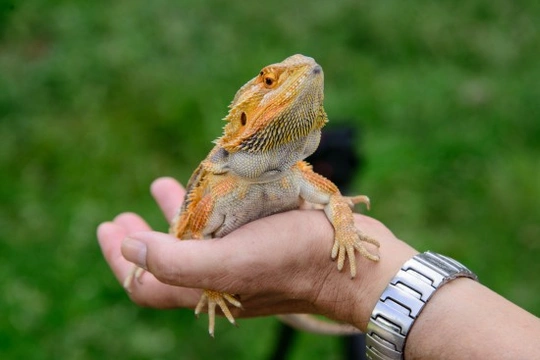
10 Great Reasons Why Reptiles Make Good Pets
When you think pet you tend to think cats and dogs, but here are 10 reasons that reptiles make great pets as well.
- For every home and owner there is a suitable reptile, from tiny geckos through to turtles, giant iguanas to small snakes and big snakes. Reptiles have evolved to suit every ecological niche and habitat, and that means there is something suited to any space and time constraints. Corn snakes, Leopard Geckos, Common Musk turtles and Brown Anoles are all examples of species that are suitable for a beginner, but there are a whole host more. I you can buy from a breeder or reptile specialist, they’ll offer you advise and even help with any questions you might have later.
- They are a lot less messy than your average mammal. Depending on the species they can stay confined to their vivarium or tank and if you keep them clean and healthy they don’t smell at all.
- No fur, dust mites and pet dander account for a huge percentage of allergies in the home, and as much as we love our mammals and birds, in this area reptiles win hands down. If someone in the house is allergic to dust mites or similar choose your bedding carefully, or go for something aquatic.
- Feeding can be as little as a couple a times a month, there are few reptiles that need to be feed a few times a day. With their metabolisms being so much slower they don’t need to eat as much as a warm blooded animal of the same size, some only having a metabolism 10% of a similar mammal. Often a concern is feeding live food, but numerous species will live happily on commercially prepared food, or are herbivorous, and so just need a twice weekly or so ration of greens.
- Some species live a lot longer than other pets. There’s none of the biyearly trip to the pet shop to replace the hamster, or the twice yearly one to replace the Betta fish. This does mean that many aren’t suitable as a short term pet though, but on the plus side there are normally numerous reptiles up for rehoming, even the more unusual ones. It’s not uncommon to see relatively rare species of turtles and other reptiles advertised on various pet classifieds, and most rescues will get more unusual species in occasionally if you are willing to wait.
- They will get to recognise you, some will get favourite members of the family. There’s nothing quite like walking into a reptile room to find a row of little faces looking out of their vivs and tanks at you, admittedly that is partly for food, but some will come out and seek out their owners for attention. One turtle in my own collection would climb over the inner fence and follow a specific family member around the garden as he was working.
- They are more than content to be left home alone all day, or even overnight if you go away for the weekend. They don’t make enough noise to annoy the neighbours either, in fact unless you tell them it’s unlikely the neighbours will even know you have a reptile tucked away.
- They don’t need walks, or grooming, or training. If you work unpredictable hours, or just know you won’t have time to give them hours every single day then they are a great choice, just remember they do need some of your time and can’t be treated like an ornament and left on the shelf and ignored.
- You can create a slice of the rainforest, desert or underwater landscape in your own home and populate it with the inhabitants that would be found in the wild. Even more you can help protect these individuals in the wild by choosing a rarer species and setting up the right environment for them to breed. Even if your babies never return to the wild by making them available to dedicated hobbyist you can reduce the numbers that are being wild caught, and ensure that a species still has an available gene pool if it is ever possible to reintroduce them to their native habitat. But source your own animals ethically, and remember that rescues are over run with specific species, including Bearded Dragons and Slider turtles.
- You never stop learning, as with all exotics there is a lot to learn and there is always new research coming out. Your little pet can be the gateway into a world of learning.
There are some downsides, whilst most reptiles are inexpensive their enclosures and equipment can be costly. But once you’ve purchased the starting kit the cost of new light bulbs etc. is relatively cheap. Depending on the species you keep food can be more expensive than the same amount of dog or cat food for example, but considering a reptile will eat only a fraction of the amount it does work out less costly overall.
It goes without saying that any pet will need care, attention and time, and with reptiles prior research is the key. Since they can live decades make sure you have the time both now and years in the future to take care of them. If you’re looking at getting a more commonly available species consider an older animal, but make sure they are healthy, as a cheap or free rescue can be expensive down the line with vet bills and a sad premature death from growing up in the wrong conditions.
If you’re considering a reptile as a pet, go for it. They can be great and rewarding pets to have, and whilst not all are the sort that you can get out and cuddle they will still steal a place in your heart.



